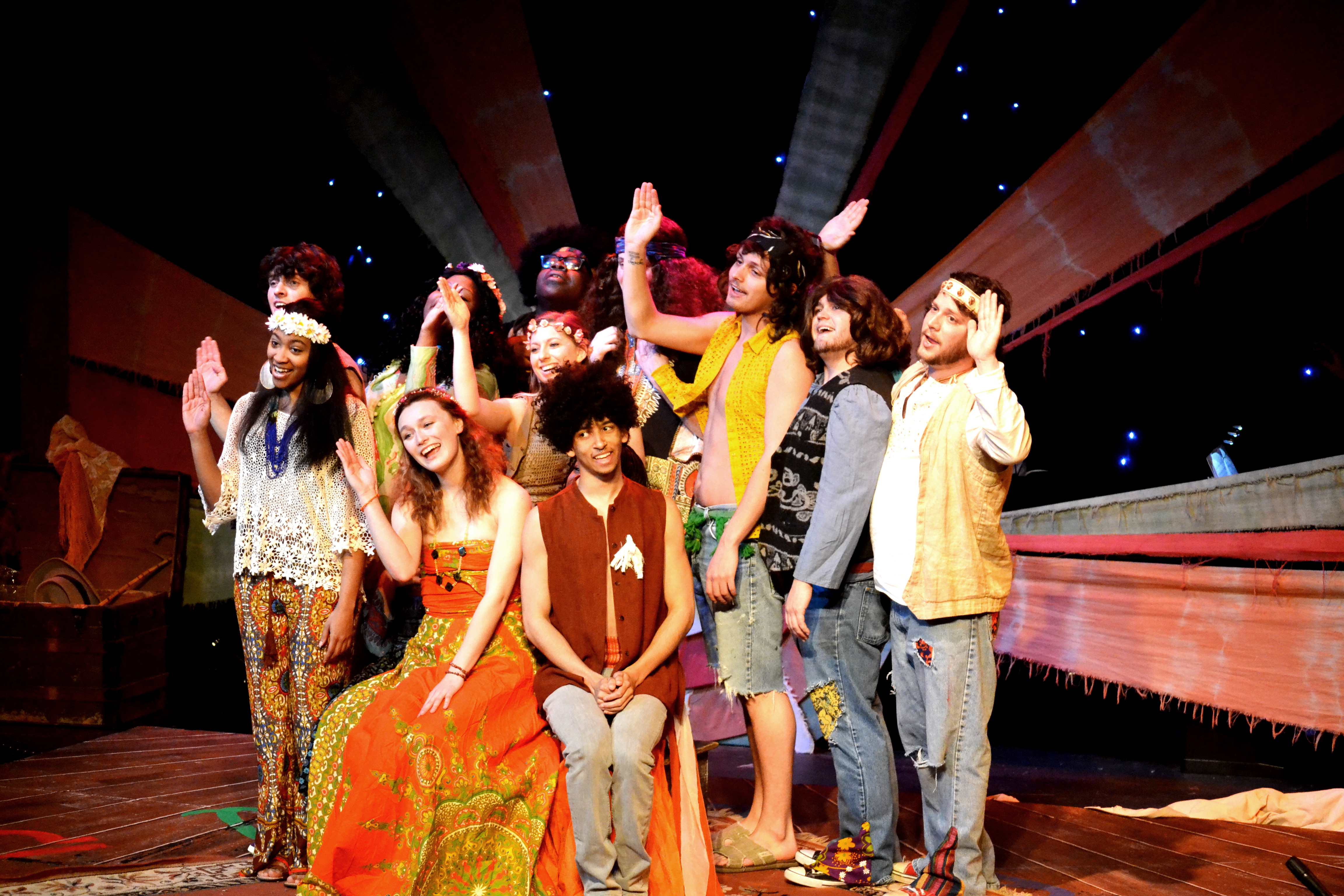The Cumberland Theatre’s Production of “HAIR” Brings Good Vibes, Great Music
Four more performances of the Cumberland Theatre’s production of “HAIR: The American Tribal Love-Rock Musical” remain. The musical, by James Rado and Geroma Ragni with music by Galt MacDermot, highlights the different attitudes in American society during the Vietnam War. The tribe followed in “HAIR” is a product of the hippie counterculture and sexual revolution of the 1960s. The characters express their feelings against the war through music and peaceful protests.
The play has caused much controversy over the years for its profanity, irreverence of the American flag, use of illegal drugs, treatment of sexuality and nude scenes. The music broke new ground in musical theatre by starting the genre of “rock musical,” using a racially diverse cast and inviting the audience to partake in the finale. Many of the songs performed became anthems of the anti-Vietnam War peace movement. The show opened on Broadway in April of 1968 after an off-Broadway debut at Joseph Papp’s Public Theater in October of 1967. The Cumberland Theatre’s rendition hit the stage on April 23rd.
The Cumberland Theatre has been in operation since 1988, first functioning as a summer theatre project through Frostburg State University. The non-profit theatre is owned and operated entirely by a volunteer board of trustees. In 1991, Dr. and Mrs. Nicholas Giarritta purchased and renovated an empty church on Johnson Street, making it the current home of the Cumberland Theatre. Don Whisted has been the Artistic Director of the Cumberland Theatre since 1991 and has since produced and/or directed over 100 productions. Emmy Award-winning and Academy Award-nominated actor, Allegany High School graduate William H. Macy delighted the board by agreeing to serve on it in 2003.
The politically active hippies of the “tribe” consider themselves to be members of the “Age of Aquarius,” which refers to the New Age movement of the 1960s and 70s. They fight for peace, love, equality and freedom wholeheartedly. Each song performed by the cast is related to issues young adults in the 60s and 70s frequently faced, including race, sexuality and war.
Among the tribe are friends and leaders, Claude and Berger, who struggle with Claude’s recent draft notice. Members of the tribe urge Claude to tear apart his draft card and burn it as an act of disobedience against the government and a way to avoid the violence of the war. The tribe members also experience the differences of their own generation and their parents’ generation. Claude’s conservative parents persuade him to serve in Vietnam, despite his friends’ resistance.
Tribe leader Sheila, who lives with both Claude and Berger, aspires to spread love. As an intelligent New York University student, Sheila’s passion and determination is evident through her political activism and awareness. With love, she gifts Berger a yellow satin shirt, which he harshly rejects. Her reaction to this rejection reflects her desires for love and respect.
Aimee Conley is a junior theatre major at Frostburg State University who plays the role of Sheila in the Cumberland Theatre’s performance. In Conley’s opinion, Sheila is “the light of the show.” She sees Sheila’s extreme passion about equality and peace as inspiring. Conley understands that Sheila has so much love in her heart, but she thinks that she still feels somewhat empty in relation to her love for Berger. Conley says her favorite part of the show is when the tribe acts out Claude’s hallucination about the war. This scene is wild, fun commotion. In addition to watching her fellow cast members act ridiculous and seeing the audience’s response to the psychedelic scene, Conley finds it thrilling to play both a Native American and an African, which is something she never thought she’d get to do on stage.
Conley says she found the week-and-a-half long rehearsal time frame to be the most difficult part of the performance. Although “HAIR” is her third show with the Cumberland Theatre, she still has a “small panic attack” after learning songs with the musical director, learning the choreography and then blocking the scene on stage all in a matter of two to three hours. She continues to work through the typical chaos because she “knows the end product is worth it” and simply loves performing.
FSU sophomore and Communication Studies major Justice Sifford plays the role of a tribe member in “HAIR.” Sifford, who has been acting since he was 13, finds this show different from other shows because as a tribe member, he is able to be a different version of himself. He does not play a specific character, so he does not have to separate his own personality from his role. This gives him the freedom to act more like himself on stage. He most enjoys the “Black Boys and White Boys” scene because the songs are “random and hilarious.” He challenges everyone to see “HAIR” because it is fun, moving and controversial.
“HAIR” won a Grammy in 1969 and Drama Desk and Tony Awards in 2009. A film version of the musical was released in 1979 as a war comedy-drama. The soundtrack was also released in 1979 on the RCA label. The catchy, upbeat, African-rhythmed rock songs by Rado, Ragni and MacDermot have topped various charts such as the U.S. Billboard Hot 100 and Billboard’s “Greatest Songs of All Time.”
“HAIR” is a highly informative, entertaining and well-known production, despite its controversy. Its upbeat music, outgoing cast, amusing dancing and representation of the hippie era provide plenty of laughs all while facing the truly difficult struggles of America’s past. Conley urges anyone and everyone to see the musical because “it’s got a kickass cast, and it’s an hour and 45 minutes of good vibes and bitchin’ music.”
Show times are Thursday through Saturday at 8 p.m. and Sunday at 2 p.m. Student tickets cost $10 and adult tickets are $20.
Featured photo by Lisa Wolford.




1 Comment